- Home
- Fredric Brown
Martians, Go Home Page 6
Martians, Go Home Read online
Page 6
Or did they? For a moment, he watched the table on which stood a big kettle of soup, from which a big man in a greasy apron ladled soup into bowls; he noticed that quite a few people turned down tine bowl offered them and, with a slightly sickish or disgusted look on their faces, turned and headed out again.
Luke put his hand on the arm of a man walking past him after declining a bowl. “What’s the matter?” he asked. “The soup look that bad? It smells all right.”
“Go look, chum,” said the man, disengaging his arm and hurrying outside.
Luke stepped closer arid looked. There was a Martian, he could see now, sitting or squatting in the middle of the bowl of soup. Every few seconds he would bend forward and stick a tremendously long chartreuse tongue into the soup in front of him. Then he’d pull his tongue back and pretend to spit out the soup, making a very disgusted and very disgusting noise in the process. The big man with the ladle paid no attention, dipping soup right out through the Martian. Some of the people in the line—the ones who’d been here before, Luke suspected—paid no attention either, or walked past with eyes carefully averted.
Luke watched a minute longer and then went outside. He didn’t join the line. He knew perfectly well that the Martian’s presence in it had no effect whatsoever on the soup. But just the same, be wasn’t that hungry yet, and wouldn’t be while his money lasted.
He found a little five-stool diner, empty of customers and, for the moment at lest, also happily empty of Martians. He ate a hamburger sandwich and then ordered another one and a cup of coffee.
He’d finished the second sandwich and was sipping at the coffee when the counterman, a tall blond kid of about nineteen said, “Let me hot it up for you,” and took the cup to the coffee urn, filed it and brought it back.
“Thanks,” Luke said.
“Want a piece a pie?”
“Uh—I guess not.”
“Blueberry pie. It’s on the house.”
“At that price,” Luke said, “sure. But how come?”
“Boss is closing up the place tonight. We got more pie than we’ll sell by then. So why not?”
He put a slab of pie and a fork in front of Luke.
“Thanks,” Luke said. “Is business really that bad?”
“Brother, things are tough,” said the counterman.
3.
Brother, things were tough. Nowhere tougher than in the fields of crime and law enforcement. Offhand, you’d say that if things were tough for the cops they’d be good for the crooks, or vice versa, but it didn’t work out that way at all.
Things were tough for the forces of law and order because crimes of passion and sudden violence were up, way up. People’s nerves were already wearing thin. Since it did no good to attack or quarrel with Martians—or even to try to attack or quarrel with them—people quarreled with and fought with one another. Street fights and domestic fights were a dime a dozen. Murders—not the premeditated variety but ones committed in sudden anger or temporary insanity—were two bits a dozen. Yes, the police had their hands full and their jails even fuller.
But if the cops were overworked, professional criminals were underworked, and hungry. Crimes for gain, whether of stealth or violence, planned crimes, were down, way down.
The Martians tattled so.
Take, for random but typical example, what happened to Alf Billings, Cockney pickpocket, right while Luke Devereaux was eating his lunch in the Long Beach diner. It was early evening, of course, in London. Let’s let Alf tell it in his own words.
Take it, Alf.
“Well, Guv’nor, ’ere Hi am fresh from a moon in a flowery, and Hi’m poppin’ out of an oozer after a pigs ear that took my last smash. Blimey, Hi’m on the rib. So when I gets a decko at this connaught ranger takin’ a pen’worth of chalk down the frog lookin’ like ’e’d ’ave a dummy full of bees and honey, ’e looks ripe for a buzz. He takes a decko around—no bogies. Hi see a greenie on a jam-pot near but ’ow’d Hi know ’e was a grass? Hi got to speel or there’s no weeping willow for my Uncle Ned. So I closes up and uses my fork to blag—”
Wait, Alf. Maybe you’d better let me tell what happened, in my words.
Here was little Alf Billings, fresh from a month in jail, coming out of a pub after just having spent his last change for a glass of beer. So when he saw a prosperous-looking stranger walking down the street, he decided to pick his pocket. Nobody an sight looked like a policeman or detective. True, there was a Martian sitting on top of a parked automobile nearby, but Alf hadn’t learned much about the Martians yet. And, in any case, Alf was flat broke; he had to take a chance or he wouldn’t be able to afford a place to sleep that night. So he closed up on the man and picked his pocket.
That’s what Alf just told you, but I thought it better to repeat. And f o go on from there:
Suddenly there was the Martian on the sidewalk beside Alf, pointing to the wallet in Alf’s hand and chanting delightedly, “Yah, yah, yah, yah, yah, look ’oo blaged a dummy!”
“Nark it, you bloody barstard,” Alf growled, shoving the wallet quickly out of sight into his own pocket and turning to slouch away.
But the Martian didn’t nark it. He kept pace with poor Alf, and kept up his delighted chanting. Andd with a quick look over his shoulder, Alf saw that his victim had turned, was feeling in his hip pocket and getting set to start after Alf and his little companion.
Alf ran. Around the nearest corner and right into the blue-clad arms of a bobby.
You see what I mean.
It wasn’t that the Martians were against crime or criminals, except in the sense that they were against everything and everybody. They loved to make trouble and catching a criminal either planning a crime or in the act of committing one gave them such a beautiful opportunity.
But once a criminal was caught, they were equally assiduous in heckling the police. In court they would drive judges, lawyers, witnesses and juries to such distraction that there were more mistrials than completed ones. With Martians in a courtroom, justice would have had to be deaf as well as blind in order to ignore them.
4.
“Damn good pie,” Luke said, putting down his fork. “Thanks again.”
“More coffee?”
“No, thanks. I’ve had plenty.”
“Nothin’ else at all?”
Luke grinned. “Sure, a job.”
The tall young man had been leaning both hands on the counter. He suddenly straightened. “Say, that’s an idea, brother. Would you take one for half a day? From now till five o’clock?”
Luke stared at him. “You serious? Sure I would. Better than wasting the afternoon looking for one.”
“Then you got yourself one.” He came around from behind the counter, pulling his apron off as he came. “Hang up your coat and put this on.” He tossed the apron on the counter.
“Okay,” said Luke, not yet reaching for the apron. “But what’s it all about? What’s the score?”
“I’m heading for the hills, that’s the score.” And then at the expression on Luke’s face, he grinned. “All right. I’ll tell you all about it. But let’s introduce ourselves. I’m Rance Carter.” He stuck out his hand.
Luke said “Luke Devereaux,” and shook it.
Rance sat down on a stool, one stool away so they could face one another. He said, “Wasn’t kidding about being a hillbilly; anyway I was one till two years ago when I came to California. Paw and maw got a little farm—bottom land, too—near Hartville, Missouri. Wasn’t satisfied there then, but with what’s happenin’ now—and me outa work for God knows how long, reckon I shore want back there now.” His eyes were shining with excitement—or homesickness—and with every sentence his accent slipped farther and farther back into the hillbilly.
Luke nodded. “Good idea. At least you’ll eat. And there’ll be fewer Martians around a farm than in a city.”
“You said it. Made up muh mind tuh go back soon as the boss said he was closin’ up. Sooner the better and I been gettin’
in a hellfire hurry all mornin’ and your askin’ about a job give me an idea. Promised the boss I’d keep the place open tell five uh-clock—when he gets down—an’ guess I’m too damn honest tuh jest close up an’ walk out on him. But it cain’t make no deffrence ef I let you do it instead, can it?”
“I guess not,” said Luke. “But will he pay me?”
“I’ll pay you. Get ten a day besides mah eats, an’ I’m paid through yesterday. Ten bucks comin’ for today. I’ll take it out uh the register an’ leave a note, give you five bucks an’ keep five bucks.”
“Fair enough,” said Luke. “It’s a deal.” He stood up, peeling off his suit coat, and hung it on one of the hooks on the wall. He put the apron on, tied the cords.
Rance had put on his own suit coat and was at the register back of the counter, taking out two five dollar bills.
“Cal-eye-for-nee, here Ah go—” he caroled, and then paused, obviously at a loss for a second line.
“Right back home to Hartville, Mo!” Luke supplied.
Rance stared at him in open-mouthed admiration. “Hey, guy, did you think uh that jest like that?” He snapped his fingers. “Say, you oughta be a writer, or somethin’.”
“I’ll settle for being something,” Luke told him. “By the way, anything I should know about this job?”
“Nah. Prices are on the wall there. Everything that ain’t in sight’s in the ’frigerator there. Here’s the five and thanks to hell and back.”
“Good luck,” said Luke. They shook hands and Rance went out singing happily, “Cal-eye-for-nee, here Ah go—right back home to…”
Luke spent ten minutes familiarizing himself with the contents of the refrigerator and the prices on the wall. Ham and eggs looked to be the most complicated thing he might have to prepare. And he’d done that often enough for himself at home. Any writer who is a bachelor and hates to interrupt himself to go out to eat becomes a fairly good short order cook.
Yes, the job looked easy and he hoped the boss would change his mind about closing the place. Ten bucks a day, with his meals furnished as well, would be plenty for him to get along on for a while. And with the pressure off maybe he could even start writing again, evenings.
But business, or the lack of it, killed that hope long before the afternoon was over. Customers came in at the rate of about one an hour and usually spent fifty cents or less apiece. A hamburger and coffee for forty cents or pie and coffee for thirty-five. One plunger brought the average up a little by shooting ninety-five cents for a hamburger steak, but it was obvious, even to a non-businessman like Luke, that the take wasn’t covering the cost of food plus overhead, even if his own pay was the only item of overhead involved.
Several times Martians kwimmed into the place, but, as it happened, never while a customer was eating at the counter. Finding Luke alone, none of them tried to do anything seriously annoying and none stayed longer than a few minutes.
At a quarter of five Luke wasn’t hungry again as yet but decided he might as well save a little money by stoking up for the evening. He made himself a boiled ham sandwich and ate it. Made himself another, wrapped it and put it into the pocket of his coat hanging on the wall.
As he put it there his hand encountered a folded paper, the handbill that had been given to him on the street earlier in the day. He took it back to the counter and unfolded it to read while he had a final cup of coffee. “BEAT THE DEPRESSION WITH A NEW PROFESSION,” the handbill told him. And in smaller type, “Become a Consulting Psychologist.” Neither heading was in flagrantly large type. And the body type was ten-point Bodoni with wide margins; the effect as a whole was very conservative and pleasing for a handbill.
“Are you intelligent, presentable, well-educated—but unemployed?” the handbill asked him. Luke almost nodded a yes before he read on.
If you are, there is an opportunity now for you to help humanity, and yourself, by becoming a consulting psychologist, by advising people how to remain calm and to stay sane despite the Martians for however long they stay.
If you are properly qualified, and especially if you already have a fair lay knowledge of psychology, a very few lessons, perhaps as few as two or three, will give you sufficient knowledge and insight to help first yourself and then others to withstand the concerted attack upon human sanity which is being made by the Martians today.
Classes will be limited to seven persons, to permit free discussion and the asking of questions after each class. The fee will be very moderate, five dollars per lesson.
Your instructor will be the undersigned, Bachelor of Science (Ohio State, 1953), Doctor of Psychology (U.S.C., 1958), subsequently with five years’ experience as an industrial psychologist with Convair Corporation, active member of American Association of Psychologists, author of several monographs and of one book, You and Your Nerves, Dutton, 1962.
RALPH S. FORBES, PS. D.
And a Long Beach telephone number.
Luke read it again before he folded it and put it in his pocket. It didn’t sound like a racket—not if the guy really had those qualifications.
And it made sense. People were going to need help, and need it badly; they were cracking up right and left. If Doc Forbes had even a piece of the answer—
He glanced at the clock and saw that it was ten minutes after five, and was wondering how late “the boss” might be, and whether or not he should just lock the door and leave, when the door opened.
The middle-aged stocky man who came in looked at Luke sharply. “Where’s Rance?”
“On his way back to Missouri. You the owner?”
“Yeah. What happened?”
Luke explained. The owner nodded and came around the counter. He opened the register, read Rance’s note, and grunted. He counted the cash in the register—it didn’t take long—and pulled a strip of paper out of the side to check the reading on it. He grunted again and turned back to Luke.
“Business really that lousy?” he asked. “Or did you drag down a few bucks?”
“Business was really that lousy,” Luke told him. “If I’d taken in even ten bucks I might have been tempted. But not when I took in less than five. That’s less than my minimum price for being crooked.”
The owner sighed. “Okay, I believe you. Had your dinner?”
“Had a sandwich. And put another in my pocket.”
“Hell, make a few more. Enough to last you tomorrow. I’m going to close up now—what’s the use of wasting an evening?—and take home what grub’s left. But it’s more’n my wife and I can eat before it starts to spoil.”
“Thanks, guess I might as well,” Luke said.
He grade himself three more cold sandwiches and, when he left, took them along; they’d save him from having to spend money for food for another day.
Back in his room, he carefully locked the sandwiches in the tightest closing one of his suitcases to protect them from mice and cockroaches—if there were mice or cockroaches around; he hadn’t seen any yet, but he’d just taken the room that morning.
He took the handbill from his pocket to read it again. Suddenly a Martian was perched on his shoulder reading it with him. The Martian finished first, howled with laughter, and was gone.
It made sense, that handbill. At least enough sense to make him want to gamble five dollars on one lesson from the psychology prof. He took out his wallet and counted his money again. Sixty-one dollars; five more than he’d had left after paying a week’s room rent this morning. Because of his lucky break at the lunch counter, he was not only richer by that five bucks, but he’d had to spend no money on food today nor would he have to spend any tomorrow.
Why not gamble that five bucks and see if he could parlay it into a steady income? Hell, even if he never followed through and made any money out of it, he might get five bucks’ worth of information on how to control his own temper and his own reactions toward the Martians. Possibly even to the point where he could try writing again soon.
Before he could weaken and change hi
s mind he went to the telephone in the hall and dialed the number on the handbill.
A calm, resonant male voice identified itself as that of Ralph Forbes.
Luke gave his own name. “I’ve read your handbill, Doctor,” he said, “and I’m interested. When are you holding your next class, and is it filled yet?”
“I haven’t given a class yet, Mr. Devereaux. I’m starting my first group this evening at seven, about an hour from now. And another group at two o’clock tomorrow afternoon. Neither group is filled as yet; as it happens I have five reservations for each, so you may have your choice.”
“In that case, the sooner the better,” Luke said. “So put me down for this evening, please. Are you having these classes at your home?”
“No, I’ve taken a small office for the purpose. Room six-fourteen in the Draeger Building on Pine Avenue just north of Ocean Boulevard. But just a moment; before you hang up, may I explain something to you and ask a few questions?”
“Go ahead, Doctor.”
“Thank you. Before I enroll you I hope you’ll forgive my asking a few questions about your background. You see, Mr. Devereaux, this is not a—ah—racket. While I hope to make money from it, naturally, I’m also interested in helping people, and a great many people are going to need a great deal of help. More people than I can hope to advise individually. That is why I have chosen this method, working through others.”
“I see,” Luke said. “You’re looking for disciples to make into apostles.”
The psychologist laughed. “Cleverly put. But let’s not carry the analogy any farther—I assure you that I do not consider myself a messiah. But I do have enough humble faith in my ability to help others to make me want to choose my pupils carefully. Especially since I’m keeping my classes so small, I want to be sure to confine my efforts to people who—ah—”

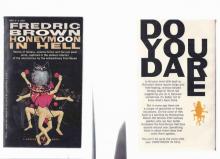 Hall of Mirrors
Hall of Mirrors Honeymoon in Hell
Honeymoon in Hell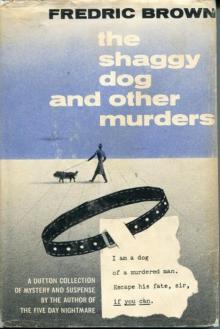 The Shaggy Dog and Other Murders
The Shaggy Dog and Other Murders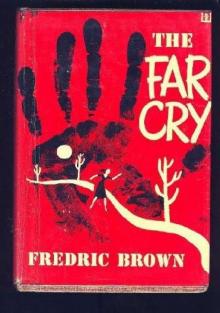 The Far Cry
The Far Cry Arena
Arena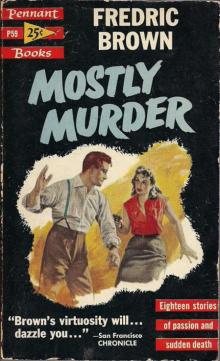 Mostly Murder
Mostly Murder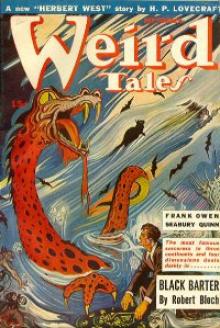 The Geezenstacks
The Geezenstacks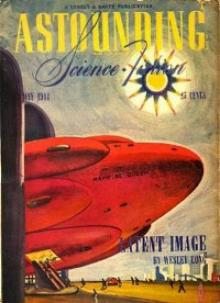 The Yehudi Principle
The Yehudi Principle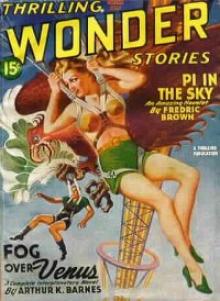 Pi in the Sky
Pi in the Sky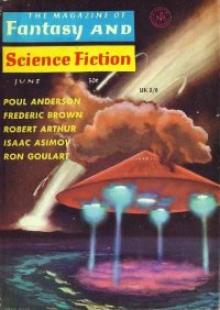 Eine Kleine Nachtmusik
Eine Kleine Nachtmusik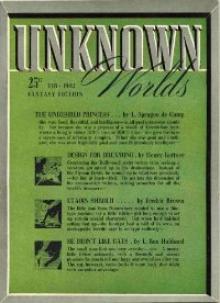 Etaoin Shrdlu
Etaoin Shrdlu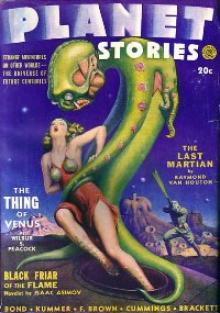 The Star Mouse
The Star Mouse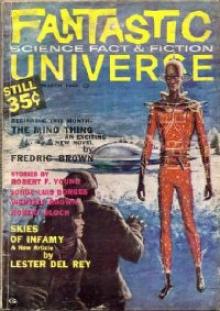 The Mind Thing
The Mind Thing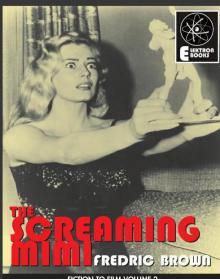 The Screaming Mimi
The Screaming Mimi The Fabulous Clipjoint
The Fabulous Clipjoint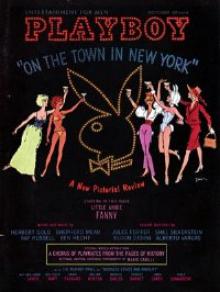 Puppet Show
Puppet Show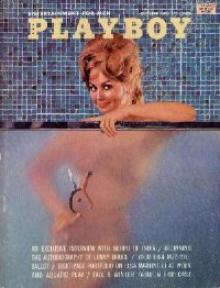 It Didn't Happen
It Didn't Happen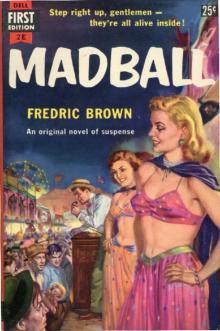 Madball
Madball Happy Ending
Happy Ending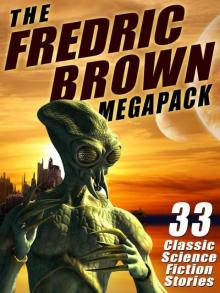 The Fredric Brown Megapack: 33 Classic Science Fiction Stories
The Fredric Brown Megapack: 33 Classic Science Fiction Stories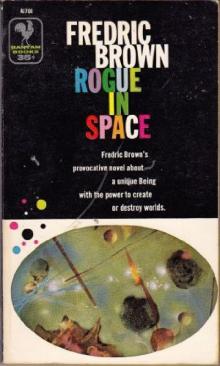 Rogue in Space
Rogue in Space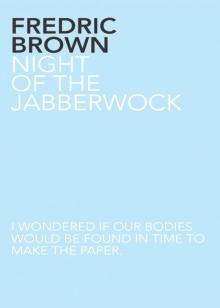 Night of the Jabberwock
Night of the Jabberwock The Dead Ringer
The Dead Ringer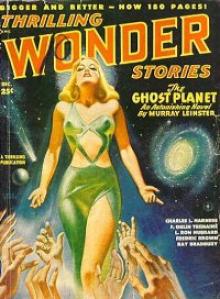 Knock
Knock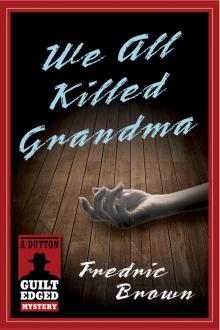 We All Killed Grandma
We All Killed Grandma Space On My Hands
Space On My Hands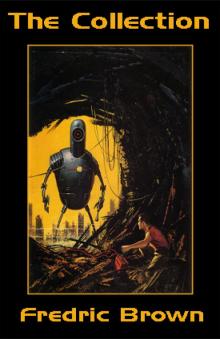 The Collection
The Collection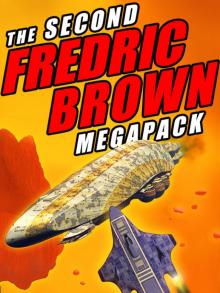 The Second Fredric Brown Megapack: 27 Classic Science Fiction Stories
The Second Fredric Brown Megapack: 27 Classic Science Fiction Stories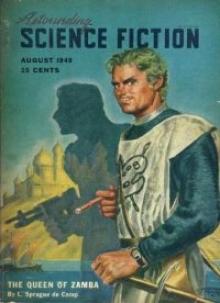 Letter to a Phoenix
Letter to a Phoenix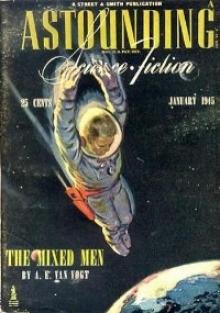 The Waveries
The Waveries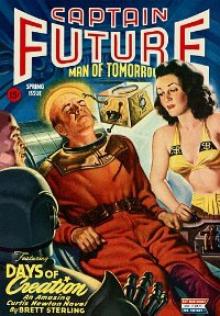 Nothing Sirius
Nothing Sirius The Deep End
The Deep End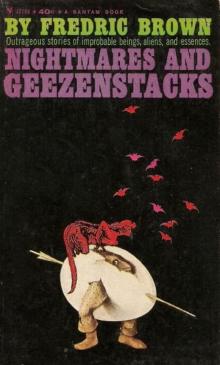 Nightmares & Geezenstacks
Nightmares & Geezenstacks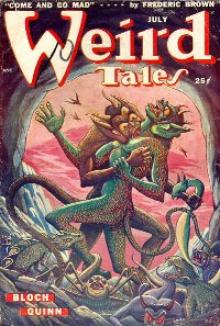 Come and Go Mad
Come and Go Mad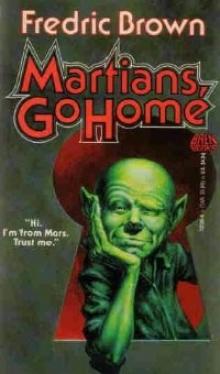 Martians, Go Home
Martians, Go Home